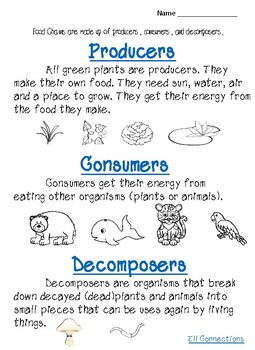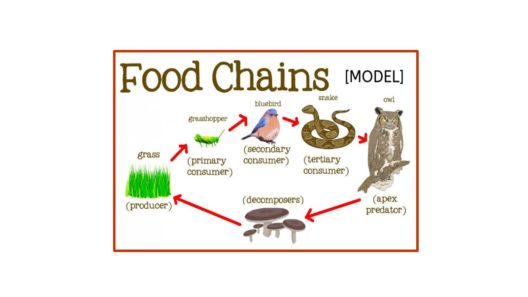
HEADLINES / Today / November 3, 2024
Producers Consumers And Decomposers Overview
Producers, Consumers, and Decomposers Overview - YouTube: This short video gives elementary students an introduction to some basic food web vocabulary: producers, consumers, and decomposers. Students will learn the.... Producers, Consumers & Decomposers in an Ecosystem | Overview: Producers are also called autotrophs. Auto means self, while troph means food. They are organisms that create their food from inorganic molecules such as water, CO2, nitrogen, and phosphate. Most .... Producers, Consumers, and Decomposers | Ecosystems - YouTube: Welcome to Producers, Consumers, and Decomposers with Mr.

PPT - Producers, Consumers And Decomposers, Oh My! PowerPoint ...
J! Need help with what producers, consumers, and decomposers are? You're in the right place!Whether.... Producers, Consumers, and Decomposers - EL Education: 1. As a group, read and look at the picture cards. 2. As a group, categorize the organisms on the picture cards as producers, primary consumers, or secondary consumers. 3. Individually record your findings in the three-column chart in your student science notebook. Invite students to begin working.. Producers, Consumers, and Decomposers in Ecosystems - Sophia: Lesson Goals: - to identify biotic factors in the environment as producers, consumers, and decomposers - describe the roles and interactions of producers, consumers, and decomposers within an ecosystem Students will gain an understanding of producers, consumers and special consumers such as decomposers, as well as the role they play in sustaining a balanced ecosystem..

There Are Producers, Consumers And Decomposers Out There! – Colegio San ...
Food Web - Education | National Geographic Society: aquatic animal that strains nutrients from water. food chain. noun. group of organisms linked in order of the food they eat, from producers to consumers, and from prey, predators, scavengers, and decomposers. food web. noun. all related food chains in an ecosystem. Also called a food cycle.. Producers & Consumers in Biology | Overview & Examples: The producer definition in biology is an organism that makes its own food. An organism is any living thing, whether plant, animal, bacteria, fungi, etc.
Producers, Consumers, And Decomposers - Worksheet | Printable, Distance ...
While plants are definitely producers .... Producers, Consumers, and Decomposers | Knowitall.org: Lesson Overview. The students will demonstrate an understanding of how the characteristics and changes of environments and habitats affect the diversity of organisms. They will be able to develop and use a food chain model to classify organisms as producers, consumers, and decomposers..

Consumers And Decomposers – Colegio San Patricio
Producers & Consumers in Biology | Overview & Examples
The producer definition in biology is an organism that makes its own food. An organism is any living thing, whether plant, animal, bacteria, fungi, etc. While plants are definitely producers ...
Food Web - Education | National Geographic Society
aquatic animal that strains nutrients from water. food chain. noun. group of organisms linked in order of the food they eat, from producers to consumers, and from prey, predators, scavengers, and decomposers. food web. noun. all related food chains in an ecosystem. Also called a food cycle.
Producers, Consumers, and Decomposers Overview - YouTube
This short video gives elementary students an introduction to some basic food web vocabulary: producers, consumers, and decomposers. Students will learn the...
Producers, Consumers & Decomposers in an Ecosystem | Overview
Producers are also called autotrophs. Auto means self, while troph means food. They are organisms that create their food from inorganic molecules such as water, CO2, nitrogen, and phosphate. Most ...
Producers, Consumers, and Decomposers - EL Education
1. As a group, read and look at the picture cards. 2. As a group, categorize the organisms on the picture cards as producers, primary consumers, or secondary consumers. 3. Individually record your findings in the three-column chart in your student science notebook. Invite students to begin working.
Producers, Consumers, and Decomposers | Ecosystems - YouTube
Welcome to Producers, Consumers, and Decomposers with Mr. J! Need help with what producers, consumers, and decomposers are? You're in the right place!Whether...
Producers, Consumers, and Decomposers | Knowitall.org
Lesson Overview. The students will demonstrate an understanding of how the characteristics and changes of environments and habitats affect the diversity of organisms. They will be able to develop and use a food chain model to classify organisms as producers, consumers, and decomposers.
Producers, Consumers, and Decomposers in Ecosystems - Sophia
Lesson Goals: - to identify biotic factors in the environment as producers, consumers, and decomposers - describe the roles and interactions of producers, consumers, and decomposers within an ecosystem Students will gain an understanding of producers, consumers and special consumers such as decomposers, as well as the role they play in sustaining a balanced ecosystem.
Related for Producers Consumers And Decomposers Overview
It is a capital mistake to theorize before one has data. Insensibly one begins to twist facts to suit theories, instead of theories to suit facts.
Keep Yourself Updated By Following Our Stories From The Whole World
Keep yourself updated with the latest stories from across the globe! Our platform brings you real-time insights and breaking news, covering everything from major world events to inspiring local stories. By following our stories, you’ll stay informed on a diverse range of topics and perspectives from around the world. Whether it’s political shifts, cultural milestones, or groundbreaking innovations, we ensure you’re always connected to what matters most. Dive into our global coverage and stay informed, no matter where you are!



